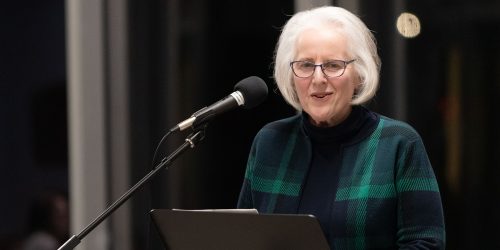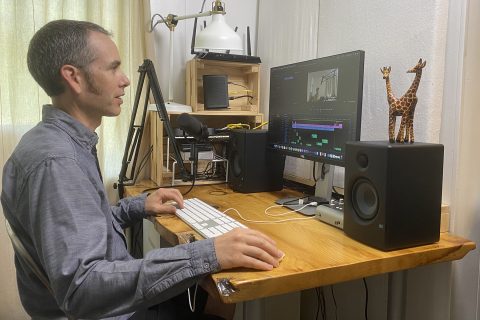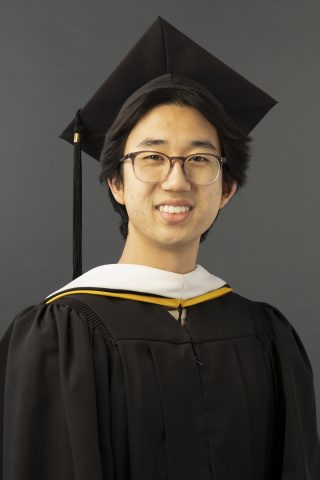
Beverly Matiko, at the spring Honors Agape Feast, enjoyed speaking to students prior to COVID-19 changes on campus. Credit: Lloyd Martinez
The following reflections capture a glimpse from three Andrews community members of what it was like to live through and respond to the disruptive reality of COVID-19. Learning continued. Community strengthened. Hope persisted.
---
Of Learning: Unexpected Lessons
by Beverly Matiko, associate professor of Communication and English
“I’m sorry we had to end this way.”
The plaintive email signoff both touched my heart and made me laugh aloud. On the one hand, it sounded like a breakup line from “Beverly Hills 90210,” a teen drama I had enjoyed long before my student was born. On the other hand, I shared this young writer’s sentiment. If 41 years of teaching has taught me anything, it’s that face-to-face contact, lively discussion, reading aloud together, exchanging hallway banter and conferencing shoulder-to-shoulder over rough drafts is what I do best and enjoy most. Having to substitute all of these proven paths to learning for whatever my 68 students and I might accomplish by switching exclusively to distance education was not my idea of a good time. But the state and the University had issued a mandate: go home and stay there until further notice.
Andrews University is proud of its claim, “World Changers Made Here.” But suddenly our world had changed drastically, not of our making and not for the better. What I couldn’t see during those mid-March moments of hug-less and hand-shake-less good-byes was that learning would still happen. But much of this learning, for me, at least, would bear little resemblance to what was outlined on my spring semester’s four syllabi, original or revised.
I learned that help can arrive even before I ask. As I struggled with how to manage student papers online in my Creative Writing class, one student emailed me with this kind offer: “Would you like me to set up a Google drop box?” Problem solved.
I learned to be less reticent about asking for help. A technology support guru spent a late night telephone session tutoring me on how to scan and post a chapter for students who had somehow arrived home sans textbook. A colleague gave me a crash course on exchanging my favorite green ink marking pen for an online grading system. All I had to do was follow the advice in Matthew 7: Ask, and it shall be given you. I’ve always found it difficult to ask for anything. Finally, I may be getting the hang of it.
I learned that conversation can be much more than pleasant diversion. It can be healing and restorative. One colleague telephones me regularly just to check in, to see how I am coping in solitary confinement. I am beyond grateful for her attention. As I write, it has been 75 days since I’ve touched another human. I have new appreciation for the truth of Genesis 2: It is not good that [anyone] should be alone.
I learned that schoolmates needn’t disappear after graduation. My own classmates who shared an undergraduate year abroad at Newbold College in England arranged a Zoom meeting on a recent Sunday afternoon. We spent over two hours online, catching up with friends in Australia, Iceland, England and coast-to-coast in the U.S. We joked, commiserated, kibitzed, reminisced and felt like teenagers again.
I learned the benefits of starting each day by reading a new poem aloud twice. When life as I knew it changed last March, I chose Kentucky farmer, environmentalist and poet Wendell Berry to help me become more centered, more focused and more appreciative of the wonders of carefully crafted language. Berry’s poetry continues to shape each morning’s meditation.
I learned that you can create a book club while sheltering in place. Each evening, I connect with a dear one through FaceTime. Together, we read several pages of J.R.R. Tolkien’s The Hobbit — a first read for me, too many to count for my responsive reading partner.
I learned that the Beatles were right about this: “I get by with a little help from my friends.” Actually, I’m pretty sure this simple claim is something I’ve always known. But I’ve never had to put it to the test as much as I have these past months. So far, we’re all passing — and with surprisingly good marks, too! Praise be.

Of Community: Unexpected Places
by Jeff Boyd, Media Relations manager, University Communication
When students, staff and faculty were exiled from campus by the novel coronavirus, we were forced to march to our new home online. As a learning community, we were suddenly compelled to ask how to sing the Lord’s song in a strange land (Psalm 137). How would we continue to pursue our mission in this most unexpected place?
With my key responsibilities in the Research office now on hold, President Luxton invited me to produce a new season of the Andrews Speaks podcast that would include an additional video component. The podcast’s theme, “Pressing Together (Remotely),” was a revision of Student Life’s co-curricular theme for the year.
Because I enjoy both audio and video production, I was excited about this opportunity to produce helpful and hopeful content for the Andrews diaspora. I wanted to share conversations that would support us through this difficult time but would also speak to life beyond COVID-19.
At first, we hoped to record the presentations in a campus studio, but when Michigan’s governor issued a stay-at-home order, each professor had to record his or her presentation on whatever equipment was on hand. Although the production quality varied, the personal touch from the speakers’ private spaces fit the moment, as we were all using Zoom at home extensively.
Each week of the series focused on a different topic — change, health, science, social ethics and creativity. These issues were chosen because they speak to life during the pandemic as well as beyond it. The skills, habits and attitudes needed to thrive during the coronavirus disruption are the same that we need throughout our lives.
In addition to these presentations that anchored each episode, Chaplain José Bourget hosted a recurring segment where he spoke on-location around campus, drawing spiritual lessons from objects like garbage bins and an access ramp. Carlisle Sutton, who worked with community engagement and service, shared videos of social action initiatives led by student groups and academic departments. These compelling stories, from addressing homelessness in Chicago to developing a children’s center in Africa, offer depth to the Andrews tagline — World Changers Made Here.
Although we all wish we could have remained on campus this semester, being forced out of our comfort zones made us learn unexpected lessons. Some of us have experienced continued loss during this pandemic, and I do not mean to minimize this difficult reality. At the same time, we have learned and grown through these experiences because we had to become even more intentional about pursuing our educational goals and even more proactive about nurturing our spiritual commitments. Despite our significant disruption, I was thankful for the opportunity to produce this series. I hope the episodes were encouraging and engaging for listeners.
While we continue to experience significant uncertainty, God has used this pandemic to teach us to be resilient, to trust Him when we do not see a way forward, to find creative ways to support each other even when we cannot be in the same residence hall room, classroom or church sanctuary, and to sing the Lord’s song no matter our circumstances. With wisdom, we will remember these critical lessons as God continues to lead us through this dark valley together.
You can find Andrews Speaks at andrews.edu/podcasts.
---

Of Hope: Unexpected Endings
by Brandon Shin, Bachelor of Science in Biology, Class of 2020
I always wanted to give a graduation speech, but I did not envision that it would look like this — an open letter to the Class of 2020.
After President Luxton and Provost Arthur broke the news that Andrews would transition to a fully online presence, it felt like time slowed down. The following 48 hours felt like months, and many of us simultaneously tried to pack our bags, say our goodbyes and cram what we thought were six weeks into less than six days.
As we reflect on the future and what could have been, I know that many of us find ourselves feeling like we’re being selfish. I certainly have. In the midst of the fear and panic that were gripping others across the nation and the world, I found myself bitter. I was bitter we had to say goodbye to our friends sooner than we had originally planned; upset that we, especially those who were the first in their families to attend university, didn’t get the gratification of walking across the stage to receive diplomas; and frustrated that although other students will return to campus — to the almost stifling Michigan humidity to march around the flag mall, attend more co-curriculars and sign up for yet another unnecessary club hoodie, we will not have that opportunity.
Yet at the same time, I find myself smiling. With tears running down my face, I am happy that we have the privilege to feel sad because it means we have things to miss; I am thankful that I feel heartbroken because it means that I have had friends I loved and who loved me. This opportunity to feel is one of the greatest gifts we are given in this lifetime. It is one of the things that makes us so distinctly human and our relationships so distinctly meaningful.
So, as we move into the future and whatever that looks like, I want to encourage you all to stay strong and stay rooted in one another. 1 Corinthians 13 says the greatest of these is love, but I think that equally as great is hope. Whether you believe that God has everything under control, or you believe that people have the capacity to bounce back from almost anything, hope inspires us to believe that tomorrow can be better than today and that we can play an active part in creating that reality.
In the future, our kids, nephews, nieces, cousins, will read about this time — COVID-19 and the world’s response — in textbooks and wonder how it’s relevant to their lives. I know I do the same with history today. And yes, we can argue that it’s an example of political strife, greed, cultural models or whatever people end up talking about. But beyond those things, please help them to understand, to realize the preciousness in everyday moments before they are forced to, and use your memories as a foundation to build your life in a way where every moment matters.